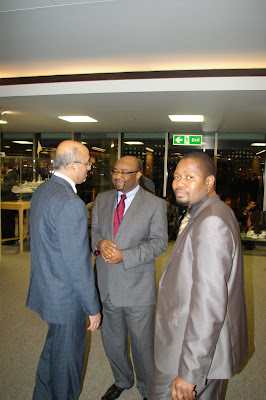 Mr. Efthimios Mitropoulos of Greece is the seventh Secretary-General of the International Maritime Organization, the United Nations agency concerned with maritime safety and security and the prevention of marine pollution from ships.
Mr. Efthimios Mitropoulos of Greece is the seventh Secretary-General of the International Maritime Organization, the United Nations agency concerned with maritime safety and security and the prevention of marine pollution from ships. Uganda is the newest member to join IMO and it was represented by Mr Katushabe Winstone CMILT, Secretary Transport Lincencing Board-Uganda
Uganda is the newest member to join IMO and it was represented by Mr Katushabe Winstone CMILT, Secretary Transport Lincencing Board-UgandaNigeria 's Imo Permanent Rep Mr William Azuh at the event with other delegates
While IMO’s prime duty will be to act proactively to ensure that accidents do not happen in the first place, its work should also be directed towards ensuring that, once an accident has taken place, the system is there to minimize its impact on human lives, property and the environment. A priority will be keeping the public opinion and politicians informed of IMO’s work in the service of an industry which represents the cleanest and cheapest mode of transporting more than 90% of the world’s goods; and making them aware of IMO’s vital contribution to the global efforts to ensure as clean and healthy a marine environment as possible.

a result of past and current emissions of what
we now know to be “greenhouse gases”, climate
change seems to have become inevitable. The climate
does not respond immediately to external influences
but, after 150 years of industrialization, global warming
now has momentum and it will continue to affect the
earth’s natural systems for hundreds of years, even if
greenhouse gas emissions are reduced immediately
and their levels in the atmosphere stop rising

With “Maritime security” now firmly established on IMO’s agenda, the Organization’s contribution to ensuring the uninterrupted flow of international seaborne trade is all the more strategically critical. Bearing in mind the importance and significance of shipping to world trade and economy, IMO must play its role efficiently and effectively towards protecting ships, ports, offshore terminals or other marine facilities against terrorist attacks. Defences must be put in place urgently, so solidly and comprehensively that terrorists and their accomplices are dissuaded from even considering attacking ships and ports or using ships as a tool to commit their atrocities or using the proceeds from shipping activities to subsidize their unlawful acts.





